FROM PACIFIC TO AFRICA: CHINA'S RIGHT ASCENSION TO AFRICA
Oktay EVLÜCE tarafındanINTERNATIONAL POLITIC ECONOMICS
From Pacific to Africa: China’s Right Ascension to Africa
Research Report
Prepared by:
Kağan BATMAZ......................................................................................................... 2.1
Oktay EVLÜCE........................................................................................................... 2.2
From Pacific to Africa: China’s Right Ascension to Africa
1.Introduction:
China has become a global actor which has been developing with the highest growth rates for many years. And also it is modernizing its army and increasing its military power to be a more effective country in the international stage. In this context, one of the most important areas for the influence of China in the world, which is a rising power, came to the fore as the African continent, especially since the 1970s.
While China's growing influence on the continent has been met with some sort of concern for both African countries and international powers such as France and the US, the main actors of Africa for years, various questions are being raised to understand the goals behind Beijing's new approach.
For this purpose, in this report study, the orientation of China towards the African continent is examined and analyzed from a multi-dimensional perspective. The report is divided into 3 topics in connection with the presentation; Topics include “A Short Brief on History of Sino-African Relations, Trade Relations Between China and African Countries, and China's Military Presence in Africa”.
2.1.Historical Background of Sino-African Cooperation – Beginning of the Relations:
a. General Overview:
After the end of the Cold War, the People's Republic of China, which has increased its interest in Africa, has increased its influence and cooperation on Africa in the first quarter of the 21st century. In recent years, Africa has become the second continent of the People's Republic of China. The expansion of China to Africa, which started with Morocco and continued with Rwanda, is continuing. The People's Republic of China, which has the largest economy in the world, aims to increase African policy and investments in the future.” (Türk-Asya Stratejik Araştırmalar Merkezi [TASAM], 2010)
b. China's Advantage in the African Continent:
The reason why Westerners have had a very negative effect on the memory of the African continent is the colonialist past of Western countries on the continent.
This gives China an advantage on the continent with no colonial history. Aware of this, China reminds of the aggression of the colonists and keeps the theme that the continent's traditional friend in China. To sum up, According to Africans China, not like the United States, France, and other colonial countries, China is not representative of ‘white’ colonialism.
China pursues a policy of noninterference in internal affairs de in the countries where it invests. Taking into account the infrastructure financing gap in Africa, China gives priority to investments aimed at improving Africa's infrastructure. (Dionne, 2016)
c. History of China's Policy of Africa:
Chinese-African relations have gone through three stages. The first stage is the period of entry into the continent from the 1950s to the mid-1970s; the second stage, between the late 1970s and the late 1990s restructuring period; the third stage is the consolidation period since 2000. In the first period, China and independent African countries concentrated on strengthening their national identity and redefining their interests. In the second period, economies underwent significant reforms; in this process, the explosive power of the economies and the increase of mutual engagement reached the third stage.
Sino-African relations since the 1950s(entry into the continent period); Conflicts stemming from the struggles for independence were shaped within the framework of the 1955 Bandung conference, an important milestone in the Cold War and Afro-Asian solidarity between the United States and the Soviet Union. In this period, “anti-imperialism” became the ideological discourse of the relations that started between China and Africa.
Relations between Beijing and China, which initiated market-oriented economic reform in the second period of Sino-African relations, remained limited. President Zhou Enlai's historic visit to the ten countries on the continent between December 13, 1963, and February 5, 1964, can be regarded as the first sign of the beginning of comprehensive relations between a country and a continent.
Two years after the death of Chinese president Mao Zedong in 1976, significant economic reforms began under the leadership of Deng Xiaoping. This development was followed by the privatization of industry since the late 1980s.
To meet the growing need for natural resources through economic growth, China has prioritized the development of political and commercial relations with natural resource-rich countries and has rediscovered Africa, which has many natural resources, and thus the third period of relations has begun. (Arslan, 2018, p. 125-142)
At the beginning of the 1990s, important interrelated developments affecting China-Africa relations took place. With the end of the Cold War, the repressive policies of the two blocs towards the continent decreased and Africa partially recovered from the clashes that had damaged itself. In this process, it was seen that the democratization struggles in Africa became intense and the economy started to revive. In this context, in 2000, the Forum on China-Africa Cooperation (FOCAC) was established to develop economic and political relations with the continent.
d. Forum on China-Africa Cooperation (FOCAC):
FOCAC's foundations were laid as a result of high-level official visits to African countries by the Chinese president in the mid-1990s. Basically, FOCAC is an institutional system that brings together African countries that are associated with China. The first FOCAC conference was held in October 2000, with the President and Prime Minister of China, four African presidents and Secretary-General of the Organization of the African Union, as well as representatives of more than 80 ministers from China and 44 African countries, as well as representatives of several regional and international organizations, African and Chinese held in Beijing with the participation of businessmen.
Important declarations were issued at the end of each FOCAC conference and new measures were taken to deepen relations. Thanks to the platform, the trade volume between the parties for 15 years has increased. At present, more than 10,000 Chinese companies operate in Africa. The partnership accelerates China's economic growth and supports Africa's growth.
e. Tanzania-Zambia railway (1967-1975):
China has begun assisting Africa in these bilateral relations. China's aid was made to various industries such as light industry, transportation, agriculture, water control, and irrigation, public health, energy, communications, sports, cultural facilities, and heavy industry. Towards the end of the 1960s, the giant Tanzania-Zambia railway, with a cost of over $ 600m, was built with the help of 15,000 Chinese workers and was an important symbol for Chinese-African relations.
2.2. China’s Investments in the African Continent:
a. Beginning of the Investments:
China’s investments are developing from year to year on the African continent. Also, China and Africa are located far away from each other, but it does not mean that they do not gain in fact from trading. The cooperation between China and Africa began centuries ago and has been developing. As for China, its main interest is to find various resources for its giant population which continues to grow as a threat to the country. On the other hand, African countries have opportunities in terms of finances, jobs, improved industry and increased foreign direct investments because of China (Daoui, 2018). So, when we look at Africa today, it would be easier to say which countries in Africa do not have an economic relationship with China than the countries that do. In fact, there is only one country that does not have any economic relationship with China and this country is Eswatini. Furthermore, China is insistent on having a relationship with Eswatini, which is located in South Africa. However, the government of Eswatini refuses Chinese investments every time. For example, The Press Officer in Eswatini, Percy Simelance, said that ‘‘we are not interested in what is being offered’’ (BBC News Africa, 2019).
b. The Reasons Why China Has Started Investing So Heavily in Africa:
i. Economic Reasons:
China's tradition of great business strategies and their findings of new ways to develop them through the years improves both the local Chinese market and China's way of interacting with other markets (Maverick, 2019). The China-Africa cooperation began centuries ago and develop day by day, but China has been establishing its economic investments in Africa for approximately 2 decades. Africa is more than a massive market for China. The most important raw materials which are relating to energies like oil, coal, etc. exist in Africa, and this led China to invest heavily in mining and oil production in the African continent. Also, China thinks that Africa always is home to vast natural resources, which other countries invest indirectly. Moreover, the Chinese population keeps growing and this situation brings new necessities such as natural resources. Maverick states that collaboration in the current global market makes Africa one of China’s greatest allies in the global arena (2019). However, China’s main interest is to find economic resources for its giant population. For instance, many new Chinese companies are entering the market and cannot find enough domestic consumption. Therefore, many Chinese firms search the new markets where they can be a competitor.
Besides some Chinese companies are developing in Africa and they also get support from the African countries. That support gives Chinese companies access to reach African government programs and subsidies. To conclude, as these Chinese firms have established themselves in China in very basic market conditions, they have a more competitive skills advantage over Western companies in Africa. Moreover, African countries are satisfied with that self-gain progress because Africa’s population rapidly increases.
- The Impact of the ‘’One Belt, One Road’’ Project in the African Continent:
The ‘’One Belt, One Road’’ (OBOR) project, internationally presented as the ‘’Belt and Road Initiative’’ and also called the great project, is one of China’s future projects in the global sector. The project was launched in 2014 under the leadership of China’s President Xi Jinping. The great project involves three different continents, in which Africa is one of them and 60 percent of the world’s population. Also, 65 countries are included in the great project and approximately 20 of them are from Africa. The great project’s main action is on the scope and essential component of the Chinese Communist Party’s national interest in restoring China as a Great Power. Economically, OBOR has been having 1700 infrastructure projects around the world worth around $900 billion (Nantulya, 2019).
- How is Africa Suitable in the ‘’Belt and Road Initiative’’?
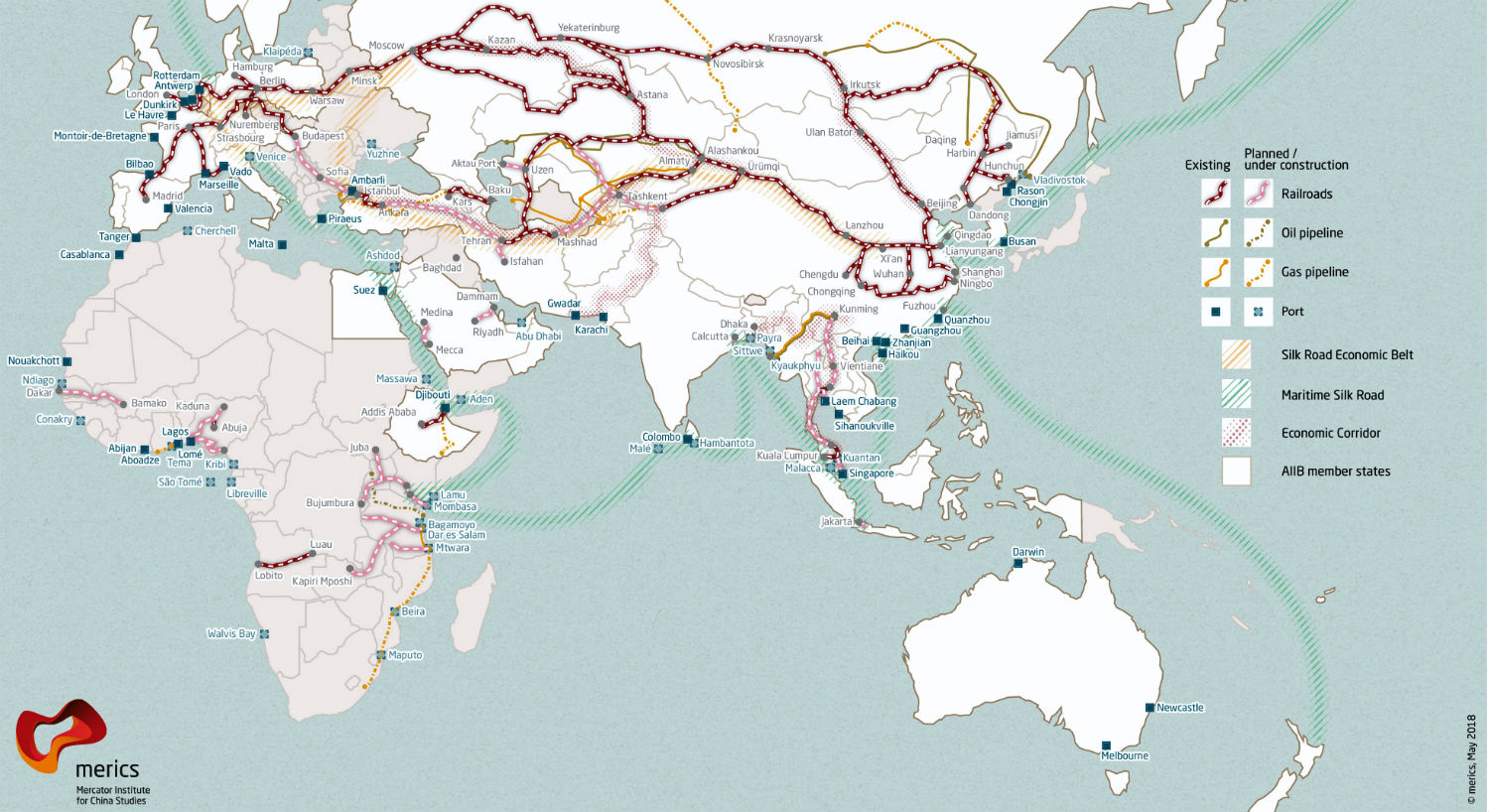
The OBOR project, which mainly involves East Africa, has found the Maritime Silk Road. Also, the Blue Economic Passage connects the Mediterranean Sea and Africa to the China-Indian Ocean. Africa’s importance due to this location gives an advantage in a maritime area where Beijing can expand strategic and trade power. On the other hand, OBOR stands to benefit the African continent because the biggest infrastructure investments are given in this way. Already, thanks to this project, maritime ports, pipelines, railways, and power plants are built and funded by Chinese investors. For instance, China set up and trained the private Kenyan police department to protect the Mombasa-Nairobi railway. Lastly, China has provided profitable investments such as telecommunication and energy for Africa. Furthermore, Africans are interested in being protected, and OBOR supports infrastructure. The World Bank estimates that Africa will need up to $170 billion investment for infrastructure requirements. The African Development Bank posted that if the African continent takes a good position for itself, it would be easier to carry out the African Union infrastructure plans with OBOR (Nantulya, 2019). In short, OBOR can be a good opportunity for both sides, but the relationship should be placed over equal interests, then OBOR can truly benefit Africa.
ii: Political Reasons:
As we see in the OBOR section, Chinese power directly relates to the political and economic influences on the continent. China is developing military influence and rising strategic and political major control over OBOR, this will hold a significant political alliance with African countries in the future (Daoui, 2018). On the other hand, the fundamentalist idea of China’s Communist Party has a soft power strategic policy in the global world economy. Since China’s economic transformation after Mao’s death and the country’s membership in the World Trade Organization (WTO), the government’s main foreign trade strategy turned to a liberal perspective although China's govern status is communist. Especially, it seems that China looks for more soft power with its economic steps in the age of the 21st century. In this context, China is investing in African geopolitical influence. According to political motivations, China is gaining more political, geopolitical and military basis powers in the continent against the other opponents year by year.
c. Sino-African Tade Volumes:
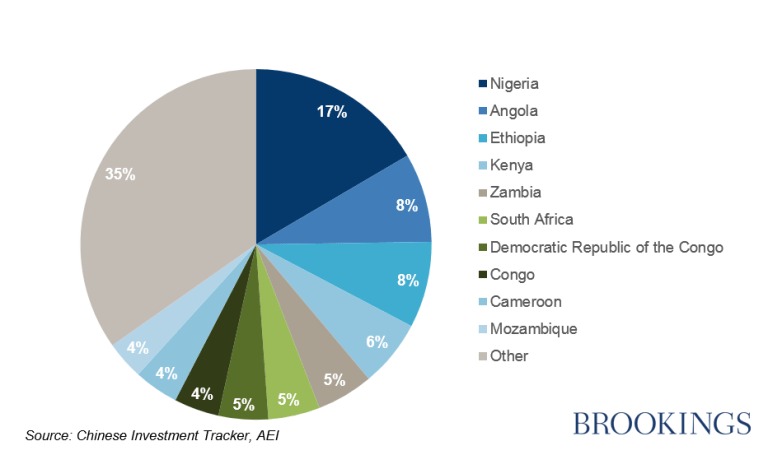
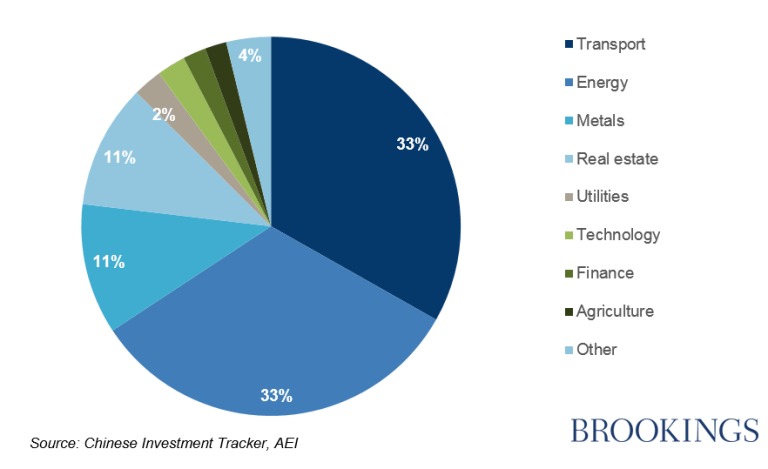
China has become Africa’s biggest economic and investor partner during the last two decades. According to the Chinese Investment Tracker, China invested mostly in oil and transport in 2018. The biggest oil-rich countries where China invested in were Nigeria (17%), Angola (8%), Ethiopia (8%) and Kenya (%8). The most important of the sectoral distribution of Chinese investments are energy (33%), transport (%33), metals (%11), real estate (%11), etc. in the African continent (Sow, 2018). After the 2015 Forum on China-Africa Cooperation (FOCAC) summit, China pledged $60 billion to the African continent, so African investments increased sharply after the summit (Sow, 2018). According to statics from the General Administration of Customs of China, in 2018, China’s total trade volume was US$204 in Africa. China’s exports to Africa were worth US$104.91 billion, and China’s imports from Africa were worth US$99.28 (MOFCOM, 2019). Furthermore, the Africa-China trade volume is increasing by 20 percent per year (I, Y, & Sun, 2017). Also, African Foreign Direct Investment (FDI) rose to US$46 billion in 2018 (United Nations Trade and Development, 2019, p. 10). Finally, the China-Africa trade volume was at the top of the world in 2018. Also, the import growth rate was at the top of the world in 2018.
d. The Impact of China’s Trade Volume on Africa:

China has approximately 10.000 companies in the African continent, and 89 percent of the companies are providing direct business investments to the African population. Nearly 300.000 African workers are benefiting from Chinese companies. Likewise, two-thirds of Chinese employers are providing different kinds of training skills. For example, apprenticeship training is provided by companies for construction and manufacturing where a skilled workforce is required (I, Y, & Sun, 2017). These companies, as we have seen in the Sino-African trade volume, have had a huge impact on Africa. Consequently, with the contribution of OBOR, the African people have been employed and this has been leading to infrastructure and modern life. Lastly, African countries’ modernization has resulted in investments in ports, railways, oil and gas pipelines and power plants in the continent.
2.3. China's Military Presence in Africa:
Although it is not as developed as its commercial and diplomatic relations, China has developed military trade and cooperation with some African countries. In addition to these relations, China supports the UN Peacekeeping Force in Africa and also organizes training programs for soldiers and policemen in some African countries. To this end, China's military presence in Africa will be examined in this part of the report, including the military port and base area in Djibouti.
In the Sino-African Cooperation and Sino-African Defense and Security Forum in 2018, Beijing declared to the world its security and defense policies for Africa.[1] According to China’s declaration; It will increase military cooperation with African countries soon. The main dynamics of China's increasing military presence in Africa is that:
► Weapon Sales
► Military Cooperation; training programs, exercises
► Military support for peacekeeping forces
► Ensure the safety of Chinese workers and investors
► Improvement of law enforcement
i. Weapon Sales:
Over the past decade, China’s role in peace and security has also grown rapidly through arms sales, military cooperation and peacekeeping deployments in Africa. Today, through FOCAC and support to the AU and other mechanisms, China is making a growing effort to take a systematic, pan-African approach to security on the continent.
In this line of thought, China's arms sales to Africa have seen a significant increase in recent years. In the five years (2013-2017), China's arms sales to Africa increased by 55 percent compared to the previous period. China's share of arms imports in Africa increased from 8.6 percent to 17 percent during this period.
The graph below shows the countries where African countries import most arms. As can be seen in the graph, China is the second country that imports African arms almost immediately after the US.

iii. Military Support for Peacekeeping Forces in Africa:
In his address to the 2015 UN General Assembly, China’s President Xi Jinping offered $100-million in military assistance over five years to support the AU’s peace and security architecture through initiatives such as the African Standby Force and African Capacity for Immediate Response to Crises.[1]
The 2015 FOCAC summit in South Africa reinforced this commitment. In Xi’s keynote address to this year’s forum and its ensuing plan of action, China pledged to channel some of that funding into a China-Africa Peace and Security Fund, military assistance and 50 programs in law and order, peacekeeping, anti-piracy, and counter-terrorism.
As a result of China's attractive policies in the peacekeeping force in Africa; today Chinese troops contribute to — Ethiopia, Rwanda, Central Africa, and DRC each provide upward of 8,000. Chinese peacekeepers now serve in the infantry, policing and other roles in Africa.
iv. Ensure the Safety of Chinese Workers and Investors:
a. Djibouti Port and China’s Military Base:
In May 2018, China began constructing additional pier facilities at Djibouti’s Doraleh Multi-Purpose Port, which has also helped finance. This base cost China 20 million dollars. However, this base in Djibouti is very important because it is China's first military base abroad. The Djibouti base enables the People’s Liberation Army to project force and protect Chinese citizens, supply chains and other interests in Africa and along its “Maritime Silk Road” across the Indian Ocean (CHAN, Stephan 2019).
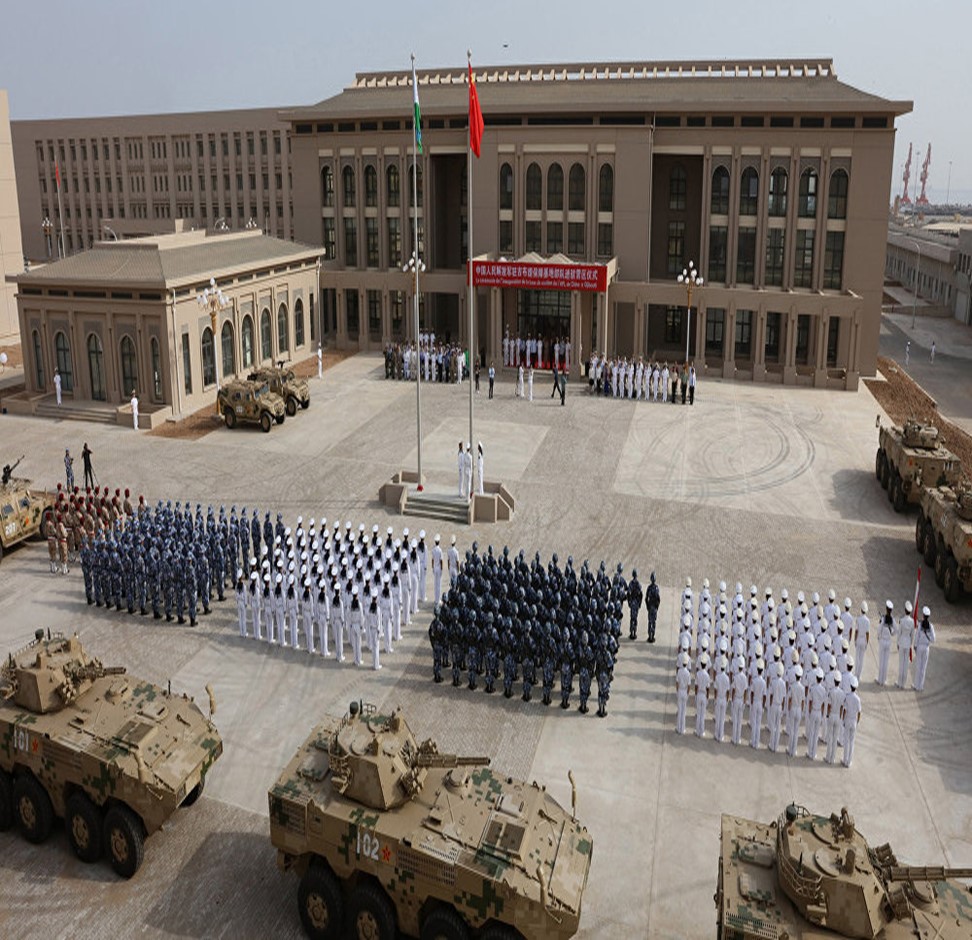
According to Beijing's 2015 security report, the Djibouti military base has critical importance to the security of Chinese citizens, the stability of the supply chain for Africa, and the Indian Ocean-Africa connection, one of the key stages of the Belt and Road Initiative.
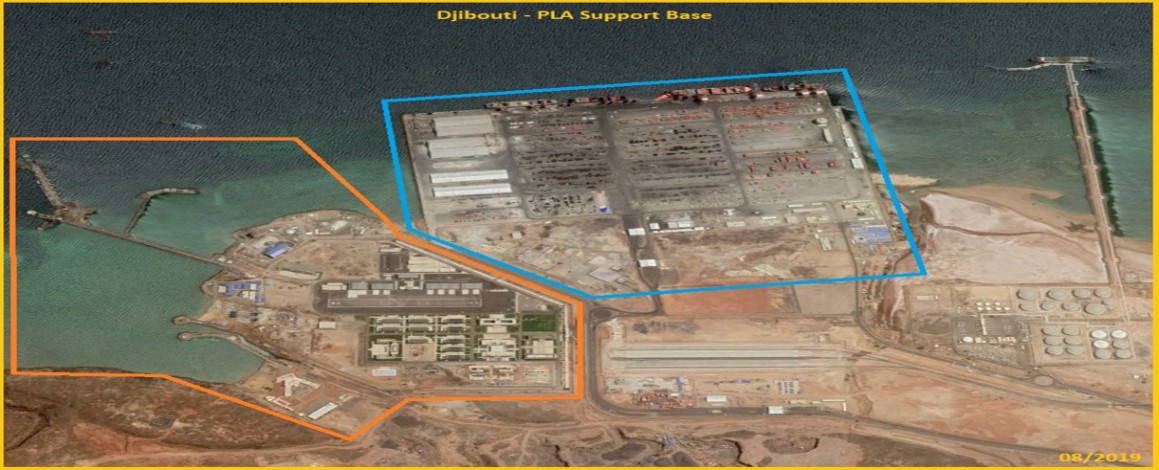
As a result, although China's military presence in Africa is not talked about as much as its other commercial and diplomatic relations, this problem may cause significant problems in the international arena soon.
Particularly in the US security report issued in 2018, take attention to China's increasing military presence in Africa has led to comments that an American-Chinese conflict may be experienced on the African continent in the near future.
Whether the current US-Chinese Trade Wars will turn into a new cold war over the African continent is a matter of another research.
References:
Tepebaş,U.(2010,April,18)TASAM. Yükselen Güçler ve Afrika' da Kalkınma Yardımları. Retrieved from: http://www.tasam.org/Files/Icerik/File/yukselen_cinin_afrika_politikalari_be95dd7b-06fd-4d60-a3de-91c8167dce64.PDF
Arslan,İ. (2018). Country-Continent Relations: A Case Study Of China-Africa Relations. Journal of Administrative Sciences, 16(31).
Xinhua.(2019,May,5).FOCAC. China to continue providing assistance for peace. Retrieved from
https://www.focac.org/eng/zfgx_4/hpaq/t1661972.html
Monson, J. Africa’s Freedom Railway: How a Chinese Development Project Changed Lives and Livelihoods in Tanzania. Bloomington: Indianan University Press, 2009
Daoui, A. (2018, November 13). China’s Trade Investment in Africa. Retrieved from https://www.waystocap.com/blog/chinas-trade-investment-in-africa/
[BBCNewsAfrica]. (2019, June 26). China’s investment in Africa: Everything you need to know. Retrieve from https://www.youtube.com/watch?v=MrVzFSXqn3w&list=PLWPOrpWmVVom_Ym89YxRa4wSIoutRFV_l&index=19&t=0s
Maverick, J. B. (2019, November 18). The 3 Reasons Why Chinese Invest in Africa. Retrieved from
https://www.investopedia.com/articles/active-trading/081315/3-reasons-why-chinese-invest-africa.asp
Ministry of the Commerce People’s Republic of China. (MOFCOM) Statistics on China-Africa Trade in 2018. (2019, January 26). Retrieved from http://english.mofcom.gov.cn/article/statistic/lanmubb/AsiaAfrica/201901/20190102831255.shtml
Nantulya, P. (2019, March 22). Implications for Africa from China's One Belt One Road Strategy. Retrieved from
https://africacenter.org/spotlight/implications-for-africa-china-one-belt-one-road-strategy/
Sow, M (2018, September 6) Figures of the week: Chinese investment in Africa. Retrieved from
https://www.brookings.edu/blog/africa-in-focus/2018/09/06/figures-of-the-week-chinese-investment-in-africa/
Sun, I. Y. (2017, June). The closest look yet at Chinese economic engagement in Africa. Retrieved from
https://www.mckinsey.com/featured-insights/middle-east-and-africa/the-closest-look-yet-at-chinese-economic-engagement-in-africa
U.N Trade and Development, World Investment Report. (2019) Special Economic Zones. Retrieved From
https://unctad.org/en/pages/newsdetails.aspx?OriginalVersionID=2109
Chandran, N. (2018, June 27). China says it will increase its military presence in Africa.CNBC. Retrieved from https://www.cnbc.com/2018/06/27/china-increases-defence-ties-with-africa.html
Kovrig, M. (2018, October 24). China's expanding military footprint in Africa. Retrieved from https://mg.co.za/article/2018-10-24-chinas-expanding-military-footprint-in-africa.
China’s military footprint in Africa. (2018, June 29). Retrieved from
https://www.diis.dk/en/activity/chinas-military-footprint-in-africa.
European Parliament. ( 2019, October) China's growing role as a security actor in Africa. Retrieved from https://www.europarl.europa.eu/RegData/etudes/BRIE/2019/642232/EPRS_BRI(2019)642232_EN.pdf
Oktay EVLÜCE

Güney Güvenlik Okulu Afrika Masası Sorumlusu.

